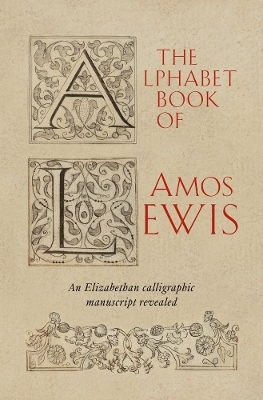
The Alphabet Book of Amos Lewis
John Adamson (Verlag)
978-1-898565-20-8 (ISBN)
The calligraphic manuscript presented here in facsimile was made in about 1585 in a bid for the patronage of an Elizabethan magnate, Sir John Petre of Thorndon Hall in Essex. Its creator, Amos Lewis, hoped that it would give pleasure to Petre's son.
A Protestant clergyman, Lewis must have despaired of employment in the Catholic Petre household. His book is unfinished; the 'Z' text ends in pencil draft. But incompletion saved it: had it entered the schoolroom it would have become thumbed and shabby and been discarded. This precious survival is the earliest known attempt at an original writing book by an Englishman. The first printed English writing book was A Book Containing divers sortes of hands (London, 1570) by John de Beau Chesne, a Frenchman.
The Alphabet Book is a delightful miniature. Lewis combined varied scripts, ornament, Renaissance grotesques, strapwork, flowers and foliage, fine roman capital letters set against moresques, and polychrome Petre heraldry to emulate printed Continental writing books. It begins and ends with poems, Latin and English, in which he presses his suit.
The context is European: printed writing manuals first appeared in Venice and Rome in the 1520s. Lewis's main model was a book by a Swiss master, Urban Wyss, published in Zurich in 1549. His Latin texts to individual letters, stressing the value of learning, draw on proverbial wisdom gathered in Erasmus's compilations of adages first published in 1500 and since expanded by others, notably in Germany. Lewis's Alphabet Book indeed opens a window into that flowering of humanistic culture which was central to learning and letters in the age of Shakespeare.
Now that the digital revolution is perceived as a threat to handwriting Lewis's manuscript Alphabet Book is also a reminder that during an earlier technological revolution, that of printing with moveable type, books promoted skill, even virtuosity, in handwriting.
The editor, Simon Swynfen Jervis FSA, is an art historian. After twenty-three years in the furniture department of the Victoria and Albert Museum, he became Director and Marlay Curator of the Fitzwilliam Museum, Cambridge, and later Historic Buildings Secretary of the National Trust. He has served as a trustee of the Royal Collection, as chairman of the Leche Trust, the Walpole Society and the trustees of Sir John Soane's Museum, and as president of the Society of Antiquaries of London. A director of the Burlington Magazine until 2024, he is now president of the Furniture History Society. Since the 1960s he has written on design and ornament, including: Printed Furniture Designs before 1650 (1974); High Victorian Design (1983); the Penguin Dictionary of Design and Designers (1984); British and Irish Inventories (2010); and Roman Splendour, English Arcadia (2015, with Dudley Dodd). His book Rare Treatise on Interior Decoration and Architecture: Joseph Friedrich zu Racknitz's 'Presentation and History of the Taste of the Leading Nations' (2019) was shortlisted for the Apollo Book of the Year Award. Two recent articles (Burlington Magazine, 2018 and 2021, the latter with Stephen Lloyd) have identified perspective paintings constituting unique visions of aristocratic life on the brink of the Civil War as commissioned in 1640 by William Paston of Oxnead Hall, Norfolk.
Foreword; Introduction; Early Printed Writing Books; English Printed Writing Books of the Sixteenth Century; Amos Lewis; Sir John Petre; The Alphabet Book (Heraldry; Ornament; Capital letters; Writing styles; Texts); Conclusion; Amos Lewis's Alphabet Book in facsimile; Picture Credits; Bibliography; Indexes
| Erscheinungsdatum | 23.03.2024 |
|---|---|
| Zusatzinfo | 17 figures, 34 facsimile plates |
| Verlagsort | Cambridge |
| Sprache | englisch |
| Maße | 185 x 275 mm |
| Themenwelt | Kunst / Musik / Theater ► Design / Innenarchitektur / Mode |
| Informatik ► Grafik / Design ► Desktop Publishing / Typographie | |
| ISBN-10 | 1-898565-20-1 / 1898565201 |
| ISBN-13 | 978-1-898565-20-8 / 9781898565208 |
| Zustand | Neuware |
| Haben Sie eine Frage zum Produkt? |
aus dem Bereich


